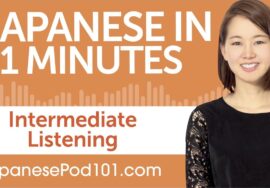35 Minutes of Japanese Listening Comprehension for Beginners
This is the best video to get started with Japanese listening comprehension for Beginners! Don’t forget to create your free account here to access personalized lessons, tons of video series, wordlists and more! ↓Check how below↓
Step 1: Go to
Step 2: Sign up for a Free Lifetime Account – No money, No credit card required
Step 3: Achieve Your Learning Goal and master Japanese the fast, fun and easy way!
In this video, you’ll challenge your Japanese listening comprehension skills. You will listen to small dialogues for beginners by Japanese native speakers. This is THE place to start if you want to start learning Japanese, and improve both your listening and speaking skills.
Follow and write to us using hashtag #JapanesePod101
– Facebook :
– Google Plus :
– Twitter :











Well, I guess my definition of “beginner” is totally different from yours… Well, back to super duper beginner’s level I go. Japanese preschool videos here I come.
Just try your best to practice. Everything may be difficult at the beginning, it’s fine. Hope that you still learn Japanese and enjoy it ?
Just practice and practice ^_^
To be honest, these are fairly basic in the sense that they cover everyday kind of situations. Thus, the grammar and vocabulary used are things commonly found in everyday speech. That’s what makes this “beginner”. Don’t be discouraged. Try coming back to this video every few months as you progress in your studies and you’ll see that it gets easier as you go.
Highly recommend Peppa pig Japanese dub for beginners
which japanese preschool videos? joining you there?
I’m roughly jlpt 5 lvl (selfthaught) and have always been wondering if Im up studying for jlpt 4 yet and after this excercise I feel like I am
helped me a lot, not too difficult but not too easy either, great
This was perfect for me as an intermediate Japanese student. I don’t know if this is quite at the beginner level though.
It’s not beginner level, actually. You’re confusing “beginner” with conversational, which is intermediate.
This definitely doesn’t look like some GENKI stuff
@Yanie L if you actually studied japanese seriously (2-3hrs a day) for 5yrs you’d already be very advanced
@Chowder But “beginner” is about time. If it takes most people a lot of practice to get to this level, it might be “elementary” but “beginner”? Nah.
@Yanie L Same, but a few more years. Never realized how much you actually pick up by watching. It’s pretty cool. Now I actually study.
I almost cried when I completely understood the first one :’) all of my studying has payed off TOT
@Baby Nyxe • ニクス Thanks!! I already have Hiragana, Katakana, and some Kanji down. My listening is okay but it needs some work. I definitely need to work on my speaking and reading more.
The typical textbook studying isn’t really working for me because I tend to get bored of it quick but I don’t want to give up.
That’s why I’m glad you mentioned podcasts, music and tv shows because I feel like that could really help me enjoy my studying!!
@Patryk Solecki I’m learning more kanji now!! My speaking still needs some work but my listening is REALLY good! Thanks for asking :))
@De’Vaughn Donigan I’m really not the best person to ask tbh lol. All I can tell you is that input is very important. Listen to Japanese all the time- japanese music, Japanese shows, Japanese youtubers, Japanese podcasts, whatever. If you have a person in your life that speaks Japanese talk to them a lot.
But when it comes to actually studying I mostly read these Japanese news articles specifically targeted towards learners. Of course, you have to already have hiragana and katakana learned. The articles have simple kanji with furigana on top. There’s an option to get rid of the furigana, so I read it over and over until I memorize the kanji, then test myself by hiding the furigana.
A Japanese youtuber I watch also suggests that you go on VR chat to talk to Japanese people, but I don’t play it. I trust his judgment tho
@Baby Nyxe • ニクス can I ask what approach you use when it comes to studying?
Can’t relate
These are really well made. Good speed and the vocab is pretty simple. Just wondering why the translations are so loosely translated. It seems you’re clearly working with native speakers who could give the exact translations. That being said, these are good tools, thanks.
@デイビッド TYSM for taking the time to explain it. Couldn’t agree more with both you and the original commenter about the students’ need for literal translations.
@winfield Wow, a civil conversation on YouTube! I definitely agree with you about more natural translations in professional work though. I hate robotic translations. But yes I think for students, literal is best at least in the beginning!
@デイビッド You have entirely changed my viewpoint good sir. You gave excellent examples and ideas. I’m glad you disagreed with me; I now agree with you as well. It’s not as black and white as I thought. In professional environments it’s good to have natural translations, but in learning atmospheres, literal translations are the way to go!
@winfield I disagree. If you’re writing a professional translation for native English speakers, then yes, you must rewrite the sentence in natural English to match the meaning/intention of the original Japanese if you want to produce something of any quality. However, for students of the language, literal translations are very important – Japanese has virtually nothing in common with English structurally or grammatically. It’s better to get to know the language on its own terms rather than trying to force things to fit into English.
For example, a natural translation of 「日本語を読めるようになりたい」would be, “I want to be able to read Japanese”. But a literal translation would be, “I want to become such that I am able to read Japanese.”
The second one is important for students to absorb because it makes the role of 「ようになる」clear. It doesn’t matter that the translation isn’t a natural way to say it in English; it IS the most natural way to say it in Japanese, and students need to get their brains to think about language the way a Japanese person does. Twisting things around to force fit them into natural English translations just makes for confusion down the road when grammar and structure get even more complicated.
To a give a specific example from this video, look at this sentence:
「はい、ですから、ドアの横の本棚の上には置けませんよ。」
(Yes, so we can’t put it on the bookshelf next to the door.)
They translate this as: “It’s too bad, it would be nice to have the new one on the bookshelf next to the door, but only one printer will fit”
This is a terrible translation for students. If I were a new Japanese learner, I would be totally perplexed. There’s nothing here that means “that’s too bad” or “only one printer will fit”. Those things are implied from context, but beginning students need to understand the literal meanings of the words before they can apply context.
exact translations are not natural in English, so it’s important not to translate it word to word, and rather meaning to meaning
I’m Japanese, and it’s easy for me to understand this exam, but people who study Japanese probably feel difficult. HOWEVER, i’m studying English, and i’m not good at understand English especially listening, but my friend who can speak English he felt pretty easy my listening exam.
It’s difficult to learn second language for all people??
(if i had mistake, please tell me!)
@Darrian Weathington no
@Nelson Johnes yoke
@Tim-Simon Holtgrefe I would say that English is easy to learn but incredibly hard to master as most languages are.
@Ziena Mohamed How are you doing now, Sir?
I think it’s kinda rough, that people call english free. It’s one of the easier languages in general, but as a linguist I can tell you, that the major differences in the structure of japanese (e.g. right to left syntactic orientation), that make it difficult for european and american people to understand, are also linked to japanese people finding english harder to learn. Languages like Korean with similar structures are therefore or should therefore, from my academic knowledge, be easier to be picked up by japanese people. Of course in the end everyone is different and academic knowledge doesn’t always mirror reality, but don’t judge this guy to quickly onegai shimasu 😉
10 months at a fairly relaxed pace of learning and I can understand over 90% of what was being said! A couple months ago, I had no idea wtf was going on lol
Lala li je serais curieuse de voir ton niveau de conversation tiens. Je prend des cours depuis 2 ans et mon mari est japonais donc je practice énormément, notamment pour le JLPT N3 et le niveau intermédiaire avancé, et mes propos précédents tiennent toujours. mais vous êtes tous des génies apparement donc bah have fun !
Lala li ok meuf.
killingov I am french and I did understand everything easily and I’ve been studying for a year ! By watching Japanese shows, films, learning songs, having conversations with people in language apps etc learning goes super fast 🙂
Jake Niziol i don’t think any of you realizes the level of complexity of the Japanese language. In a year, you can barely even reach beginner level, except if you go there and speak japanese 24/7 the whole time.
Jake Niziol I didnt mention 10 minutes a day, but regardless, I was being ironic, just in case you didn’t catch that. Also, I know exactly what level this is as I’ve been studying every day for over two years.
I am pretty happy with my progress! I have only studied for 2 months but I managed to get all the answers. Though my vocab is lacking, I didn’t really get the whole conversations just bits and pieces but enough to clearly know what was happening. I know real speech is less clear and a lot faster but I am satisfied with my progress!
It’s quite humbling that this is considered “beginner” level, but nevertheless this is perfect for where I’m at in my studies. Thank you!
it PAINS me that when i hear it the first time i dont understand it to 100%, but when i see the hiragana then i do, and i finally hear all the words. I guess thats why im sitting here listening to this.
Everyone is like that. I’m there with you
SAME it is kinda frustrating because I KNOW what they’re saying I just can’t hear it til I see it
Thank you for suggestion. After switching on the captions it’s really very easy to understand
英語のリスニングが出来なくて病んだらこれを聞いて「ははーん簡単だな」ってやってると元気でる
全く同じ笑笑
いやでも、こんな簡単なレベルですらできてない事実を突きつけられて泣きたくなる
わかります
わかるww??
There were very useful and well done exercises! Thank you.
I’m studying for the JPLT N4/N3 and I found this video perfect for learning since I could understand most of the sentence but still had to look up many words.
The best part about these videos is that you end up knowing exactly which words and verbs you should prioritize on memorizing
That was fun ? Got most of them right too. And I rarely ever use my Japanese these days, I only ever use two of my four foreign learnt languages so I am quite happy to be able to move back up to intermediate again yay
I’ve been teaching myself Japanese for the past 1.5 year so I’d say in general I’m around jlpt n4 level, but somehow I kinda forgot I needed to do listening practice until a little over a month ago? I’m a little confused since some jlpt n5 listening practices are crazy easy while some other ones I feel dumb. but then on the other hand, this is more jlpt n4 and its not too bad. ig everyone has a different view on the levels??♀️
Could you make more videos like this one but focused in the development of the reading and listening skills according to the Common European Framework of Reference for Languages, and also according to the different levels of the Japanese Language Proficiency Test, please? Thank you very much for the effort you put on this channel.
Some Japanese tend to speak faster, and I have a hard time grasping what they’re trying to say. In this video, the speakers’ voice are very clear. I can speak and read Japanese, but my listening skills are a joke. This video is very helpful.
I passed the N3 so it was not difficult for me, but for sure this exercices are not for beginners at all !!
i did enjoy them anyway, it was a good review ^^
Probaly a N5 or even N4 level
i was able to understand a good half of it, …. i havent taken n5 officially but i had japanese in highschool for 3 years
Grace Wood I’m about N4 level, aiming for N3. I didn’t really have much trouble with the listening. I agree it’s probably a little hard for N5. I figured that N5 was the absolute beginners video..
thanks for saying that. i was on identity crisis because there are words that i haven’t learned yet on this context. i feel like it’s not even n5
@Miles Pewitt This is definitely N4 level (N5 is the absolute beginner vid)
While speaking was easier for me, this is a perfect exam to train my listening, which I had huge problems with. Also my vocabulary developed instantly. After watching it again I already understood most of it, without forgetting, which happens to me quickly, when just writing down vocabulary in a notebook. The grammar in these tasks is very simple, since it is for beginners. That was maybe too easy for me to learn anything, but I guess that’s also not the point. The talking speed is perfect. It’s a bit slower than casual talk, but not so much, that it sounds completely out of place. Great job! I’m going to continue learning with this platform.
Don’t forget to…
– LIKE the video
– SUBSCRIBE to our channel
– Get your FREE account here https://goo.gl/tW2Uu2
There are a few tips for how to learn Japanese
Decide precisely why you wish to speak japanese
Try to speak japanese everyday
Find what process works for you the best.
(I learned about these and more from Fergs magic blueprint website )
NOT Free! You have been warned.
I can’t read kanji. I am still difficult to understand if there is hiragana could make it easy.
here’s a few things for how to learn Japanese
Decide exactly why you want to learn it
Try to use japanese everyday
Decide what method works for you best.
(I discovered about these and more from Fergs magic blueprint website )
hey ,if anyone else is searching for fastest way to learn to speak japanese try Sovallo Amazing Japanese Fixer (do a search on google ) ? Ive heard some awesome things about it and my buddy got great success with it.